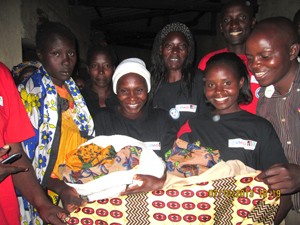
April 2014—High-pitched ululations resound at the Kahawa Dispensary in Borabu, Nyamira County, Kenya. Health workers and patients are celebrating the safe delivery of twin boys. In Kenya, one mother dies every hour from pregnancy related causes, especially at the time of delivery. Over half of all women in Kenya still give birth at home and only 47 percent of pregnant women make the recommended four antenatal care visits.
These newborns are swaddled in warm covers as health workers present their mother with a new pair of lesso (colorful traditional Kenyan fabric) and a package of cloth diapers.
Edward Moenga, 29, introduced the idea of giving a gift to new mothers. “This is a great incentive to women in our locality,” he says.
Moenga is a community health extension worker with the Ekerubo Community Health Unit. He is delighted to see first-hand how his work impacts the lives of women and children. The gift is just one of the ways health workers encourage women to give birth at the dispensary.
"We also provide them with chicken soup and vegetables from our nutrition kitchen garden demonstration center,” Moenga adds.
The Health Unit was established in March 2012. Members are trained in home and community based care by Mildmay Kenya, a USAID partner. It provides basic health services and refers families to local facilities for additional care. It also carries important health messages into the community, including the promotion of a skilled delivery attendant at birth.
When a woman delivers in the presence of a skilled health worker, she is protecting not only her life, but the life of her newborn child. Skilled health workers facilitate a safe labor and delivery, and are prepared to address emergencies arising from complications.
USAID works to make safe pregnancy and childbirth a reality for all women in Kenya. In 2013, more than 6,400 community health workers were trained to educate women and their families about the risks associated with giving birth at home, and encourage them to attend antenatal care.
To measure and evaluate the impact of their interventions, health workers also track the progress of expecting mothers – from the antenatal period through labor, childbirth and postpartum – and record pregnancy outcomes, including complications and maternal deaths. Last year, more than 322,000 pregnant women attended the four recommended antenatal visits, and nearly 453,000 women received skilled care at birth through U.S. Government supported activities.
This increase can be attributed to the Kenyan Government’s free maternity initiative launched in 2013 – eliminating the out-of-pocket antenatal and delivery costs for expecting mothers. In support of this new policy, USAID is helping the government scale up quality maternity services by improving health workers’ skills in basic emergency obstetric services and procuring vital maternal and neonatal equipment.







Comment
Make a general inquiry or suggest an improvement.